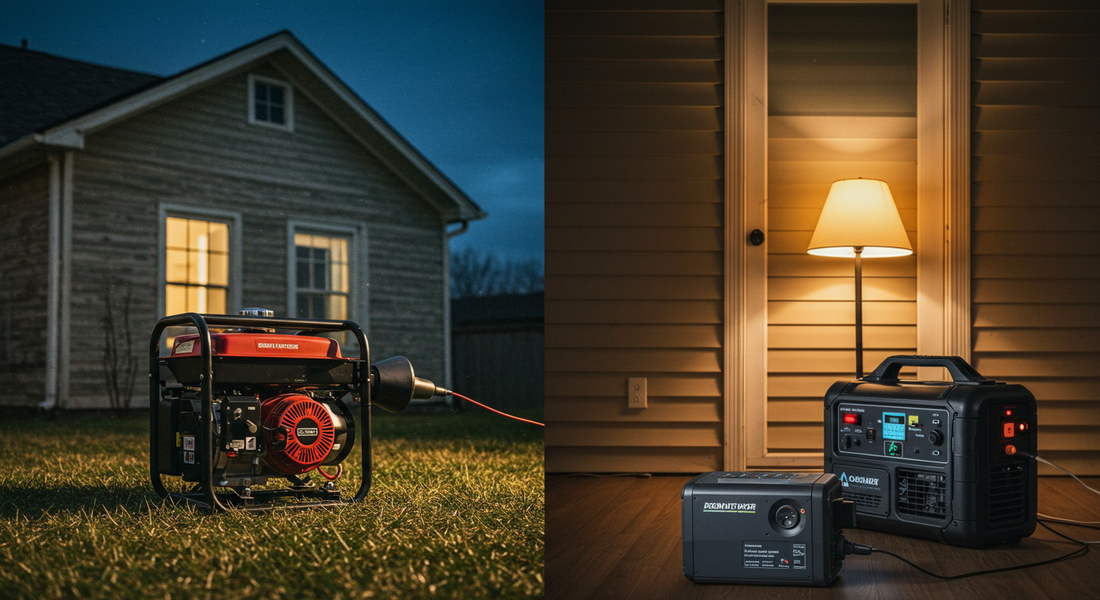
Gas vs. Solar Generators: Choosing the Right Emergency Power Source
Share

In our modern, electricity-dependent world, a power outage can quickly escalate from an inconvenience to a genuine emergency. The critical role of power in a crisis cannot be overstated—it keeps our food cold, our homes lit, our devices charged, and our vital medical equipment running.
When it comes to backup power, two main options dominate the market: the traditional gas generator and the modern solar generator. The gas vs solar generator debate is a crucial one for any prepper. The best emergency power source for you depends entirely on your specific situation, and it starts with a simple question: What are you trying to run?
The Gas Generator
A gas-powered generator is the traditional workhorse of backup power. It uses an internal combustion engine to generate a high-wattage electrical output.
-
Pros:
-
High Power Output: This is their biggest advantage. A moderately sized gas generator can power an entire home, including large appliances like refrigerators, freezers, and well pumps.
-
Lower Initial Cost: On a watt-for-watt basis, gas generators are significantly cheaper to purchase upfront than their solar counterparts.
-
-
Cons:
-
Fuel Storage: They require a substantial and potentially dangerous supply of stored gasoline, which degrades over time and needs to be stabilized.
-
Noise and Fumes: They are extremely loud and produce deadly carbon monoxide fumes, meaning they must never be used indoors, in a garage, or near open windows.
-
-
Best Use Cases: Gas generators are the best choice for those who need to power their entire home, run multiple large appliances simultaneously, or operate high-draw power tools.
The Solar Generator (Portable Power Station)
Often called a portable power station, a "solar generator" is technically a large battery that can be recharged via solar panels. This distinction is key to understanding its function.
-
Pros:
-
Silent and Fume-Free: They are completely silent and produce no emissions, making them safe for indoor use. This is a massive advantage in an apartment or during a storm.
-
Renewable Fuel: As long as you have sun, you have a limitless source of fuel. They are also virtually maintenance-free.
-
-
Cons:
-
Lower Power Output: They cannot compete with gas generators in terms of raw power. They are designed to run smaller devices, not an entire home.
-
Weather Dependent: Recharging is dependent on clear, sunny skies, which may not be available during a storm.
-
Higher Initial Cost: The upfront cost for a solar generator and panels is significantly higher than for a comparable gas generator.
-
-
Best Use Cases: This portable power station review finds them ideal for apartment dwellers or for those whose primary needs are to charge essential devices (phones, laptops, radios), run small medical equipment (like a CPAP machine), or power a few lights and a small fan.
Making Your Decision: A Comparison Chart
To help you decide how to choose a generator, here's a quick comparison:
|
Feature |
Gas Generator |
Solar Generator (Power Station) |
|---|---|---|
|
Initial Cost |
Lower |
Higher |
|
Power Output |
Very High |
Low to Moderate |
|
Fuel Source |
Gasoline (Finite) |
Solar (Renewable) |
|
Indoor Use |
No (Dangerous) |
Yes (Safe) |
|
Noise Level |
Very Loud |
Silent |
|
Maintenance |
High |
Very Low |
|
Portability |
Heavy |
Lighter |
Conclusion: The Hybrid Approach
For the ultimate resilient power strategy, the best solution is often a hybrid approach. A powerful gas generator can be kept in the garage for major, whole-house power needs, while a smaller, portable solar generator is kept inside for immediate, safe access to power for your essential small electronics. When choosing your emergency power source, it's not about which one is universally "better," but about matching the right tool to your personal preparedness plan and environment.
